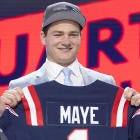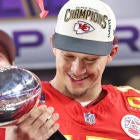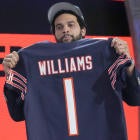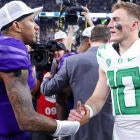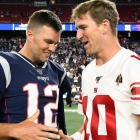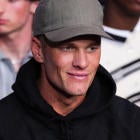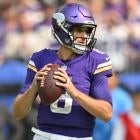Jameis Winston signed his rookie contract less than 24 hours after the Tampa Bay Buccaneers made him the first player taken in the 2015 NFL Draft. A first overall pick hasn't signed so quickly since 2009 when Matthew Stafford's deal was announced the same day he was drafted. A year earlier, Jake Long agreed to terms three days before the Miami Dolphins selecting him with the first pick.
Stafford and Long were exceptions. Before the 2011 Collective Bargaining Agreement (CBA) changed the way rookies are compensated, most top-10 picks didn't sign contracts until the latter part of July as the start of training camp approached. First-round picks holding out wasn't unusual either. For example, 2007 first overall pick JaMarcus Russell held out for 47 days before signing with the Oakland Raiders.
Holdouts are largely a thing of the past because the 2011 CBA essentially created a rookie wage scale with specific salary parameters for each draft slot. Draft picks are signed at a much quicker pace under the rookie wage scale. In addition to Winston, Amari Cooper (fourth pick), Kevin White (seventh pick), DeVante Parker (14th pick), Kevin Johnson (16th pick), Nelson Agholor (20th pick) and Shaq Thompson (25th pick) have already signed contracts.
There's a substantial increase in draft pick salaries for the first time since the rookie wage scale was implemented. More specifically, signing bonuses are 15 percent higher than in 2014 after a three year freeze.
Increases in rookie deals are tied to growth of the salary cap. Stagnation occurred last year despite the salary cap going up by more than eight percent because money borrowed in 2012 and 2013 from future rookie pools was repaid in 2014. The borrowing was necessary to prevent rookie deals from being less than in 2011 because the increase in minimum salaries was greater than the growth in the cap. With the debt completely repaid, increases for rookie contracts in the future will be dictated by the terms of the 2011 CBA.
All deals for draft choices are four years. These contracts can't be renegotiated until the conclusion of a player's third regular season. This means the earliest Winston's deal can be redone is late December 2017 or early January 2018.
Teams have an option for a fifth year with first-round picks. This fifth-year option must be exercised after the third year of rookie contracts (2018 for the 2015 draft class), with a May 3 deadline. The fifth year is guaranteed for injury when the option is exercised. The option year becomes fully guaranteed on the first day of the league year in the fifth contract year (early March 2019 for the 2015 draft class).
The fifth-year salary for the top 10 picks is the transition tender, which is average of the 10 highest salaries for a player's position, in the fourth year of his contract. The fifth-year salary for players selected outside of the top 10 (picks 11-32) is the average of the third through twenty-fifth highest salaries at a player's position.
Below are the deals the top 10 picks are expected to sign and the value after taxes. I enlisted the help of Robert Raiola (@SportsTaxMan on Twitter), who is the Sports and Entertainment Group Senior Manager at O'Connor Davies in New Jersey, to provide his expertise for the tax calculations.
Taxes for professional athletes are more complicated than people in most other professions because their income is earned in the states where they play. Raiola said, "People are surprised that athletes are required to file taxes in their home state and practically every state where they play a game. Some cities, such as Detroit, Cleveland, Cincinnati, St. Louis and Kansas City, also tax athletes."
All federal and state taxes are included in the calculations. The tax implications of playing in a game in London or charitable contributions aren't a consideration. Players are considered as a resident of the state where they play and agent fees are the maximum 3 percent allowed under NFLPA regulations. For convenience sake, the net wages have been rounded.
| Projected salaries for top 10 picks | |||||||
| Pick/Name | Club | Residence | State Income Tax | 2015 Cap Number | Signing Bonus | 4-Year Total | After Taxes |
| 1. Jameis Winston | Buccaneers | FL | None | $4,609,323 | $16,697,292 | $25,351,277 | $14,730,000 |
| 2. Marcus Mariota | Titans | TN | None | $4,402,541 | $15,870,164 | $24,213,976 | $14,106,000 |
| 3. Dante Fowler | Jaguars | FL | None | $4,270,953 | $15,343,812 | $23,490,242 | $13,689,000 |
| 5. Brandon Scherff | Redskins | VA | 5.75% | $3,857,389 | $13,689,556 | $21,215,640 | $11,580,000 |
| 4. Amari Cooper | Raiders | CA | 13.3% | $4,120,567 | $14,742,268 | $22,663,119 | $11,380,000 |
| 6. Leonard Williams | Jets | NJ | 8.97% | $3,387,430 | $11,809,720 | $18,630,865 | $9,859,000 |
| 7. Kevin White | Bears | IL | 3.75% | $3,011,463 | $10,305,852 | $16,563,047 | $9,273,000 |
| 8. Vic Beasley | Falcons | GA | 6% | $2,635,496 | $8,801,984 | $14,495,228 | $7,960,000 |
| 9. Ereck Flowers | Giants | NJ | 8.97% | $2,616,697 | $8,726,788 | $14,391,834 | $7,661,000 |
| 10. Todd Gurley | Rams | MO | 6% | $2,513,521 | $8,314,084 | $13,824,366 | $7,500,000 |
Negotiable items
Contracts are fully guaranteed for every pick in the top half of the first round. The two primary negotiating issues with top 10 picks are the payment schedule of the signing bonus and whether salary guarantees will have offsets.
Typically, when a player has a large signing bonus in his contract, it is paid in installments with some portion deferred to a future year(s). $6 million of Winston's bonus is deferred to until March 31, 2016. In 2014, only three of the top 10 picks received their entire signing bonus before the end of the calendar year. Sammy Watkins (fourth overall) and Khalil Mack (fifth overall) of the Buffalo Bills and Oakland Raiders were the highest picks without 2015 deferrals.
An offset clause allows a team to reduce the guaranteed money owed to a player when he is released by the amount of his new deal with another team. The player receives his salary from the team that released him in addition to the full salary from his new contract with another club when there isn't an offset (also known as "double dipping"). Practically speaking, the offset issue will only come into play in the latter years of rookie deals if the player is a disappointment.
Agents have largely conceded the offset issue. Second overall pick Greg Robinson (St. Louis Rams) and third overall pick Blake Bortles (Jacksonville Jaguars) were the only players selected in the top 10 of the 2014 draft that didn't have offsets. As a compromise, teams are structuring deals containing minimum base salaries in the final three years with the remainder of a player's salary in annual fully guaranteed third- or fifth-day of training camp roster bonuses. This is how Winston and White's contracts are structured. Winston is the first quarterback taken in the top five since the 2011 CBA overhauled rookie compensation with offsets.
It will be a surprise if Fowler or Gurley have offsets. The Jaguars have never required offsets for top-five picks, which the team has for a fourth consecutive year. The Rams established a precedent of first round deals without offsets in 2012 with Michael Brockers, the 14th pick. The precedent has been adhered to consistently.
Tax implications
The difference in after tax earnings between Fowler, the third pick, and Cooper, the fourth pick, is significant. There's slightly over an $800,000 difference between the two picks before taxes. The disparity grows to approximately $2.3 million, which is almost triple, once taxes are factored into the equation.
"The 2015 draft is unique because it's the first time the top three picks are from states without a state income tax," Raiola said. The Raiders having the fourth pick creates the biggest possible income gap from the higher picks because California has the highest rate in the country at 13.3 percent." Florida, Tennessee, Texas and Washington are the only places with NFL teams where there isn't a state income tax.
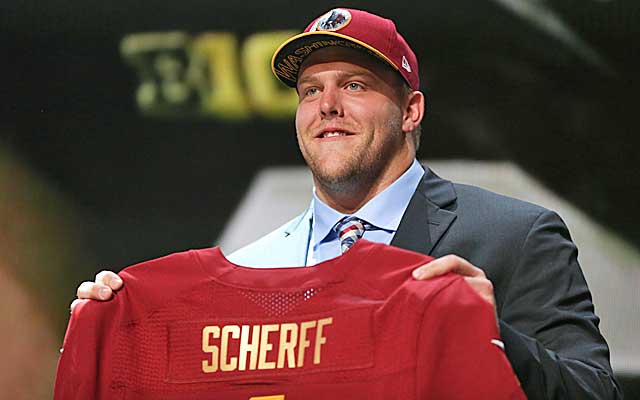
Cooper also falls behind fifth pick Scherff in salary after tax earnings. "Players drafted by California teams that are residents will be paying close to 50 percent of salary in income taxes, in most instances," Raiola said.
Another notable tax situation
There's a more interesting after-tax earnings situation later in the first round, which is in the chart below.
| Arik Armstead vs. Byron Jones | ||||||||
| Pick/Name | Club | Residence | State Income Tax | 2015 Cap Number | Signing Bonus | 4-Year Total | After Taxes | |
| 17. Arik Armstead | 49ers | CA | 13.3% | $1,789,569 | $5,418,276 | $9,842,630 | $5,068,000 | |
| 27. Byron Jones | Cowboys | TX | None | $1,563,989 | $4,515,956 | $8,601,940 | $5,010,000 | |
Byron Jones will sign a contract with the Cowboys as the 27th pick that's almost $1.25 million less than Arik Armstead will receive from the San Francisco 49ers as the 17th pick. Their net wages over their four-year contracts will be essentially the same despite the 10-pick difference, thanks to taxes.
Sizing up financial hit to Gregory, Collins
• It was anticipated that Randy Gregory would fall in the draft because of his marijuana usage and reported failure to show up for scheduled meetings with at least three teams during the pre-draft evaluation process. The surprise is Gregory wasn't selected until the 60th pick by the Dallas Cowboys.
Gregory may have been the Atlanta Falcons' choice over Vic Beasley for the eight overall pick without the red flags. Beasley is expected to sign a fully-guaranteed four-year, $14,495,228 contract, which includes an $8,801,984 signing bonus. Gregory's projected deal as the 60th pick is $3,814,937 over four years. Almost $1.4 million should be fully guaranteed, of which $1,034,500 will be a signing bonus. Gregory's off-the-field issues have cost him upwards of $10.7 million.
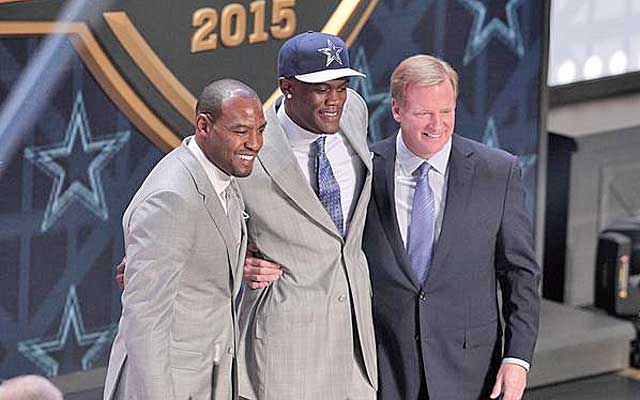
• La'el Collins received an unprecedented contract for an undrafted free agent. The constraints of the rookie wage scale only allow teams $86,957 for signing bonuses with their undrafted free agents and minimum base salaries for three years.
Since Collins had interest from more than half of the NFL, he received a fully guaranteed three-year, $1.596 million contract from the Dallas Cowboys, which includes a $21,000 signing bonus. His base salary guarantees don't have offsets. The largest salary guarantee for an undrafted free agent signed with his draft class under the 2011 CBA before Collins was Michael Bamiro at $248,270 with the Philadelphia Eagles in 2013.
Collins' deal could complicate Randy Gregory and Dez Bryant's negotiations. Gregory's deal as a second-round pick is expected to have almost $1.4 million fully guaranteed. Priority Sports represents both Gregory and Collins. It may be difficult for Dallas to justify to Priority why their undrafted free agent client should have more guaranteed money in his deal than Gregory.
Tony Romo and Brandon Carr are the only Cowboys besides Collins without offsets in salary guarantees. Collins' guarantees without offsets will be an issue for Tom Condon, Bryant's agent, if the issue hasn't been raised previously in contract discussions.
Loss of value policies
Oregon cornerback Ifo Ekpre-Olomu was a potential first-round pick before tearing the ACL in his left knee and dislocating his knee cap in December practices leading up to the College Football Playoff. The Cleveland Browns selected Ekpre-Olomu in the seventh round (241st overall pick) even though he may not be ready to play football until 2016.
Fortunately, Oregon purchased a loss-of-value insurance policy for Ekpre-Olomu, which cost around $40,000, before the 2014 season started. The policy has a $3 million payout for being drafted after the second round because of injury.
The $3 million payment will be tax free, assuming International Specialty Insurance honors the policy. No college player that has a loss of value has ever collected. Marqise Lee is suing Lloyd's of London for a $4.5 million payment after the company denied his loss of value claim for dropping to the second round of the 2014 draft.
Joel Corry is a former sports agent who helped found Premier Sports & Entertainment, a sports management firm that represents professional athletes and coaches. Before his tenure at Premier, Joel worked for Management Plus Enterprises, which represented Shaquille O'Neal, Hakeem Olajuwon and Ronnie Lott.
You can follow him on Twitter: @corryjoel
You can email him at jccorry@gmail.com












